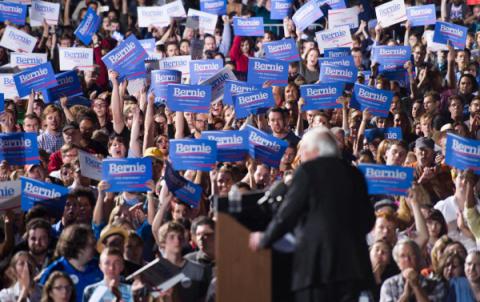One of the more interesting themes of the Bernie Sanders campaign is his call for a political revolution. When I first heard him use this phrase, I wondered what he actually means. It's one of those common yet amorphous words at risk of meaning anything - or nothing.
So how are supporters of Sanders' campaign supposed to interpret the call for revolution? It could be nothing more than hyperbolic red meat for a country in an outsider-ish mood. Perhaps "revolution" is just an adjective describing the totality of policy prescriptions he supports, from Glass-Steagel to paid family leave.
A great thing about Sanders' NOT giving a full, detailed, explicit answer is that it forces his growing community of supporters to start figuring it out for themselves. Far from being a distraction from the business of generating votes and delegates, it's an essential component of having a revolution. Spectacular politics, the televised, digitized, firehose of polling results and gotcha moments is quite different from the business of revolution. Bernie is inviting us to have a foot in each world - so let's take him up on that.
A revolution requires organization. All the iconic leaders, in any century, were basically spokespersons for groups that met and voted, simply trying their best to represent. Questions about what kind of organization or network is required have preoccupied would-be revolutionaries throughout our history. We should be thinking about and experimenting with kinds of organization and mass participation for one simple reason: whatever exists today hasn't worked yet.
A century ago, the American Socialist Party had 100,000 members. That's about .1 percent of the population; a similar number today would be 300,000. Erica Chenowith estimates that the number of people needed to bring a genuine (nonviolent) social transformation is much higher - perhaps 3.5% of the population. That's about 11 million Americans.
Revolutionary ideas are not sets of policy proposals. They are ways of upsetting the `commonsense' view of things in favor of a new one. Sanders said at a recent event that the current distribution of wealth is immoral. This is a revolutionary idea in a society where most people have been taught from a young age that wealth is the product of hard work, or that there is no alternative to the dominance of the markets over our democracy. Without explicit shifts in the mindset of large numbers of people, policy proposals that run counter to the consensus fall on deaf ears. While many fellow citizens have revolutionary ideas in their heads, we know that the number of these people, and the intensity of their convictions are less than enough to make those ideas work. So we need mechanisms to popularize our ideas and permeate popular culture with them.
The electoral arena is insufficient, on it's own, to achieve radical change. The United States was constructed, intentionally, to allow our elites to hold firm against waves of populist sentiment and even inconvenient voting habits. These bulwarks against change include the `first past the post' method of winning elections, the resulting two party system, the Electoral College (indirect elections) and an unaccountable central bank (`The Fed') that answers to financiers, not the people. But politicians rarely prioritize non-electoral methods for achieving change, and certainly not during elections. A multi-billion dollar industry is devoted to electoral politics, but there is no parallel infrastructure of comparable size for social movements or community organizing. A revolution requires that we need to interconnect electoral politics with grassroots movements during and between elections seasons, in an ongoing and uninterrupted way. We know this is true, because we've seen political candidates suck out people, money, and attention from social movements, leaving folks on the ground confused, demoralized and unprepared for the next challenge.
I'm not a revolutionary theorist and I certainly won't try to channel what Bernie Sanders thinks about these questions. But I think the hundreds of thousands of people mobilized to help Bernie Sanders win, and the millions more eager to vote for him ought to spare a moment to think about these things. Not alone, but in communities of many shapes and sizes. Not as an alternative to the important work of winning the vote but as a necessary condition for winning that vote. Not later, by other people, but now - and by you.
This was the idea that led us to form People for Bernie - a parallel project with these goals, completely committed to aiding the Sanders campaign and spreading its message. Our eyes are on the primary, the convention, and beyond.
If you're interested in advancing the revolutionary potential of the Bernie Sanders campaign - please sign up with People for Bernie. Political revolution, here we come.
[Charles Lenchner is Co-Founder, People for Bernie. Co-Founder, Ready for Warren. Executive Director, Organizing 2.0. Digital strategist.]


Spread the word